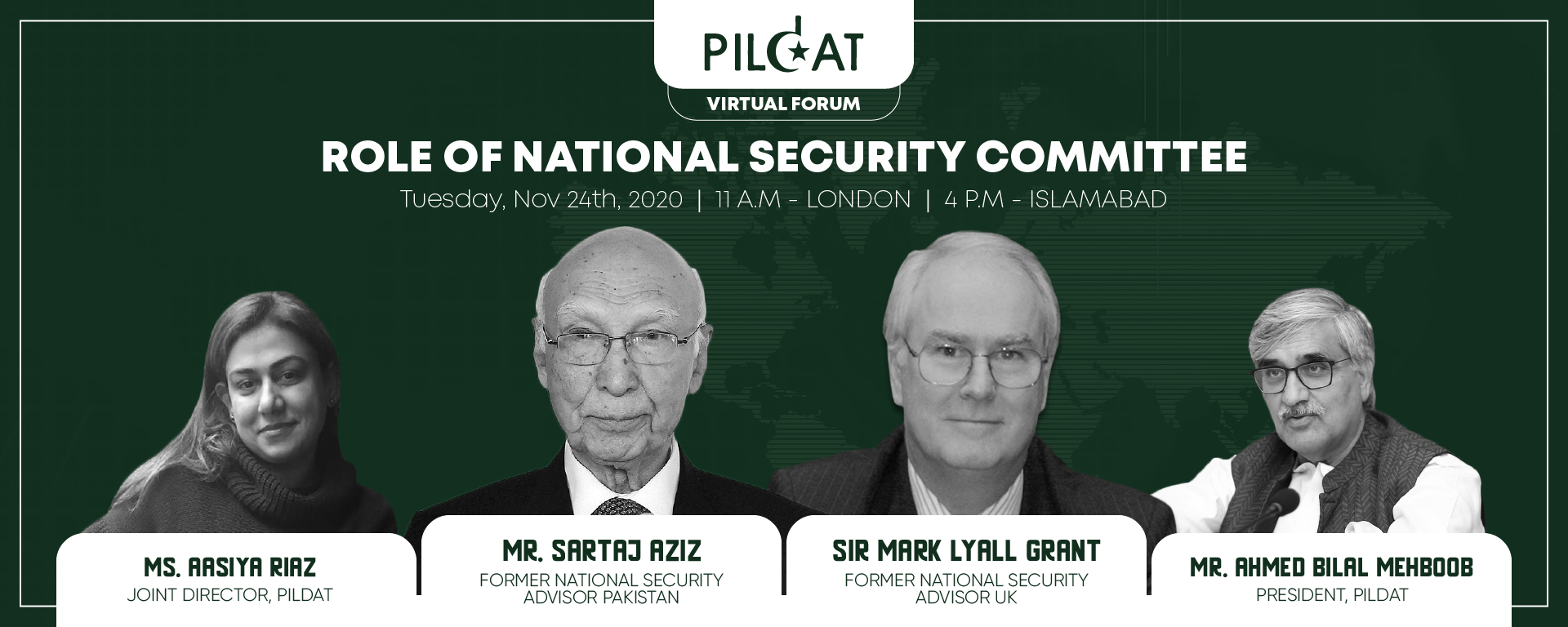
On November 24, 2020, PILDAT hosted a Virtual Forum on the Role of the National Security Committee in Pakistan. Moderated by Ms. Aasiya Riaz, PILDAT Joint Director, the Forum included Mr. Ahmed Bilal Mehboob, President PILDAT, Sir Mark Lyall Grant, former National Security Advisor of the United Kingdom and Mr. Sartaj Aziz, Pakistan’s former National Security Advisor as panellists.
In his conversation, Mr. Ahmed Bilal Mehboob raised questions that he said are needed to be answered about the National Security Committee in Pakistan. He highlighted that Pakistan’s National Security Committee was the only committee where uniformed personnel served as permanent members. In other similar systems, services chiefs are invited, when needed. He also highlighted that in most countries around the world, similar forums such as Pakistan’s NSC were only advisory in nature while in Pakistan the NSC serves as a decision making forum. He also questioned that since the NSC in Pakistan functions without any law and existed independent of the Federal Cabinet, what legal value do the decisions of the NSC hold? He also said that considering Pakistan’s perennial civil military problems, was there ever an attempt made to resolve the civil military imbalance at an NSC meetings?
Sharing his experience of serving as the National Security Advisor under two British Prime Ministers, Sir Mark Lyall Grant talked about how a need was felt for setting up the National Security Council after the UK got embroiled in wars due to multiple intelligence failures. He focused on the importance of the National Security Council in the UK and how it had allowed for decision making to become more formalized and collaborative. He stressed on how the setting up of the NSC brought with it a host of new risks and challenges including the threat of over-centralizing decision making. Towards the end of his talk, Sir Mark Lyall Grant said that while the outcomes of the decisions taken through the NSC were yet to be seen, the Council had served as an important tool to provide an audit trail of how decisions regarding national security were made in the UK.
Being architect of the National Security Committee in Pakistan, former National Security Adviser, Mr. Sartaj Aziz gave a historical overview of the process to have a body like the National Security Committee constituted and the barriers he faced in setting up the NSC. Mr. Sartaj Aziz said that he intended that the National Security committee would meet on a quarterly basis but this could not be achieved. He particularly stressed that an Advisory Board and a Planning Committee were meant to be set up under the law but were never established despite the passage of 7 years. The NSC had failed to meet quarterly as was planned and apart from the government under Prime Minister Mr. Shahid Khaqan Abbasi, all Prime Ministers had failed to hold the requisite number of NSC meetings.
The Virtual Forum ended with a question and answer session where both speakers addressed questions regarding the National Security Council / Committees workings in their respective countries and gave recommendations for how the bodies could better serve their respective purposes. A detailed video of the Virtual Forum is available at PILDAT Website, PILDAT Youtube, PILDAT Facebook and PILDAT Twitter.






